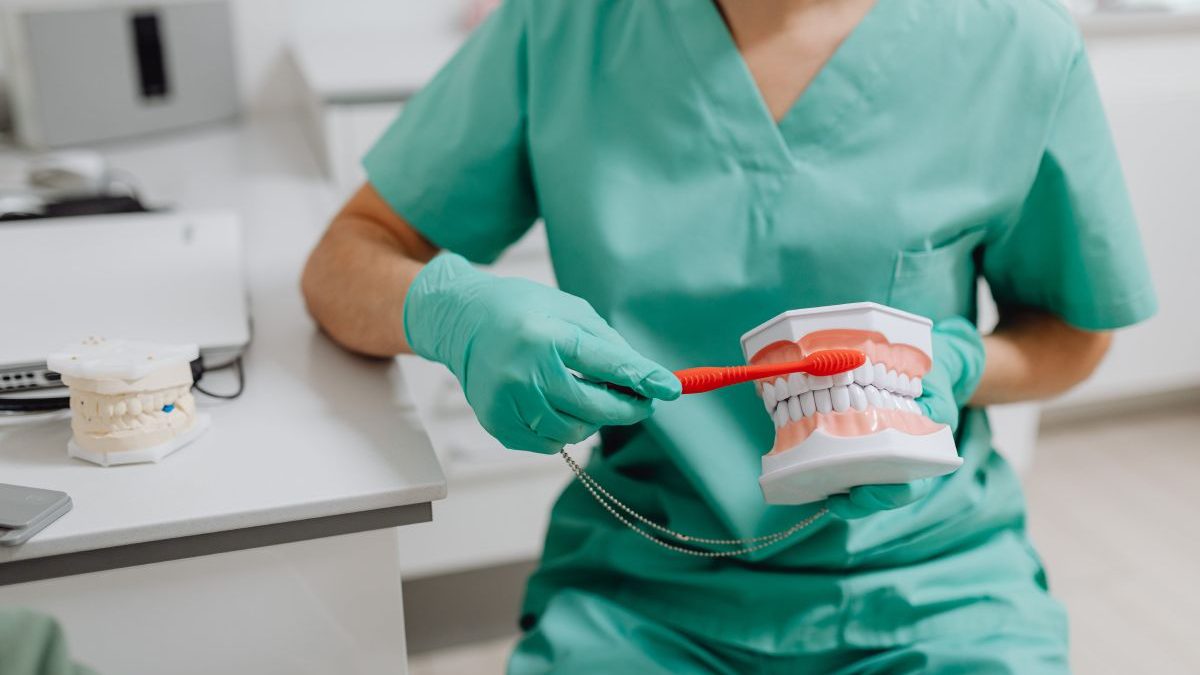Oral hygiene is a pivotal determinant of overall health, necessitating a comprehensive and multifaceted approach for effective maintenance. Beyond the indispensable daily practices of brushing and flossing, which undoubtedly form the bedrock of oral care, there exists a persistent challenge posed by the accumulation of tenacious plaque and tartar. This resilient build-up, often resistant to conventional at-home practices, underscores the crucial role of professional teeth cleaning.
Administered by skilled dental professionals, this procedure is instrumental in not only removing obstinate plaque and tartar but also in providing a nuanced and thorough approach to oral health enhancement. The expertise and precision involved in professional teeth cleaning elevate its significance as a cornerstone in the overarching strategy to preserve and fortify oral well-being.
Table of Contents
The Importance of Oral Health
Oral health extends far beyond the aesthetic appeal of a bright smile; its significance is deeply intertwined with one’s holistic well-being. The repercussions of inadequate oral hygiene are multifaceted, encompassing not only common issues like cavities and gum disease but also extending to systemic conditions such as cardiovascular disease and diabetes. The intricate connection between oral health and these broader health concerns underscores the critical need for preventive measures.
Investing in proactive oral care is indispensable, serving as a foundational strategy to mitigate the risk of a cascading array of health issues and ensuring a robust foundation for overall well-being. This proactive approach not only safeguards oral health but also contributes to the prevention of potentially severe systemic conditions.
Professional Teeth Cleaning: An Integral Component
Professional teeth cleaning, referred to as prophylaxis in dental terminology, encompasses a meticulous process aimed at removing plaque and tartar deposits meticulously from both the teeth and gums. Even with dedicated at-home oral care practices, some areas prove challenging to access, fostering the accumulation of persistent bacterial deposits. If left unaddressed, these deposits can become breeding grounds for oral diseases. In this context, the significance of regular professional cleanings extends beyond mere plaque and tartar removal; they serve as proactive measures to eliminate hidden bacterial reservoirs, thereby effectively preventing the initiation of potential oral health issues.
The Process of Professional Teeth Cleaning
Embarking on the journey of professional teeth cleaning is akin to treating your smile to a spa day orchestrated by the skilled hands of a dental hygienist or dentist. This revitalizing process unfolds through a sequence of meticulously crafted steps:
- Personalized Assessment: Before the cleansing ritual commences, the dental professional thoroughly evaluates your oral health. This involves a close examination of your teeth and gums, allowing them to detect any subtle signs of inflammation or potential issues that might lurk beneath the surface.
- Precision Plaque and Tartar Removal: Armed with specialized tools, the dental virtuoso delicately eradicates plaque and tartar from every nook and cranny of your teeth. This precision is paramount, as it not only promotes a sparkling smile but acts as a formidable defense against the lurking threats of cavities and gum disease, ensuring your oral fortress remains unyielding.
- Luxurious Scaling and Polishing: Post-plaque purging, your teeth are treated to a spa-like scaling session, smoothing out rough patches. This decadent treatment doesn’t just stop at removing remnants; it’s a preventative embrace against future plaque build-up, leaving your teeth feeling luxuriously smooth and radiant.
- Opulent Fluoride Treatment: As a grand finale, your teeth may bask in the luxury of a fluoride treatment. This lavish application strengthens the enamel, creating an impenetrable shield against cavities, transforming your teeth into resilient warriors poised for battle against the forces of decay.
Benefits of Professional Teeth Cleaning
Here are some of the benefits and disease prevention you would experience by having professional teeth cleaning procedures:
- Prevention of Gum Disease: Gum disease, characterized by inflammation and infection of the gums, can lead to serious oral health issues if left untreated. Professional teeth cleaning effectively removes the factors contributing to gum disease, mitigating the risk.
- Cavity Prevention: Plaque and tartar are significant contributors to tooth decay. Regular cleanings help prevent the formation of cavities by eliminating these harmful deposits.
- Fresh Breath: Bacteria in the mouth contribute to bad breath. Professional teeth cleaning removes these bacteria, promoting fresher breath and improved oral hygiene.
- Early Detection of Oral Issues: Regular dental check-ups and cleanings allow for the early detection of potential oral health problems. This enables timely intervention, preventing conditions that could lead to more serious consequences.
- Preservation of Natural Teeth: Professional teeth cleaning contributes to preserving natural teeth by preventing cavities and gum disease. This is crucial for maintaining proper oral function and aesthetics.
Conclusion
In summary, professional teeth cleaning is an indispensable element in the overarching strategy to uphold optimal oral health. Despite the essential nature of daily brushing and flossing, these practices may prove insufficient in reaching the concealed nooks and crannies where plaque and tartar tend to accumulate persistently. The significance of routine cleanings administered by dental professionals extends beyond mere plaque removal, offering a holistic solution that actively thwarts the development of gum disease, cavities and other oral health issues.
As a proactive and far-reaching measure, individuals are strongly encouraged to prioritize regular dental check-ups and professional cleanings, thereby ensuring their smiles enduring vitality and health throughout the years. By embracing these practices, individuals not only safeguard their oral well-being but also contribute to their overall health and quality of life.

